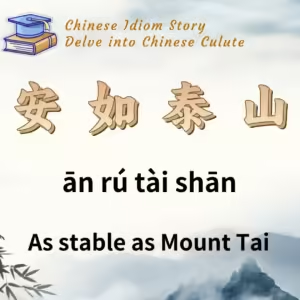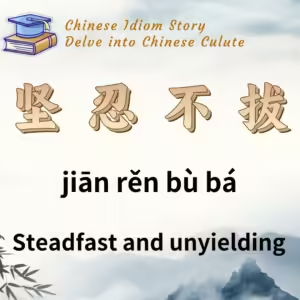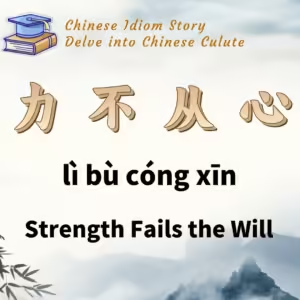
Chinese Idiom: 安如泰山 (An Ru Tai Shan)
English Translation: As stable as Mount Tai
pīn yīn: ān rú tài shān
Idiom Meaning: This idiom metaphorically describes a situation that is very stable and reliable. It can also be used to characterize something that is extremely solid and unshakeable.
Historical Source: 西汉枚乘《上书谏吴王》 (Western Han Dynasty, Mei Cheng’s “Letter to Advise King Wu”).
Idiom Story:
In 149 BC, after Han Jingdi (Liu Qi) ascended to the throne, Chao Cuo became his chief advisor and held the position of Minister of Justice. Chao Cuo firmly advocated for the policy of reducing the power of feudal lords.
During the time Liu Qi was still a prince, the crown prince of the Kingdom of Wu, Liu Xian, visited the capital to pay his respects. While drinking and playing chess with Liu Qi, a dispute arose, leading Liu Qi to strike Liu Xian with the chessboard, resulting in his death. King Wu, Liu Bi, was furious and refused to attend court, claiming illness.
Chao Cuo submitted a memorial to Jingdi, explaining the situation. He highlighted that when Emperor Gao (Liu Bang) unified the realm, he distributed land to his relatives, which led to powerful feudal lords. Chao noted that now, due to the tensions caused by the death of the crown prince, Liu Bi’s refusal to attend court posed a significant threat to the Han dynasty.
Chao advised that whether they reduced Liu Bi’s territory or not, he would rebel. If they cut his land, the rebellion would be swift and less damaging; if they didn’t, it would take longer but cause greater harm.
In the third year of Jingdi’s reign, Liu Qi accepted some of Chao Cuo’s suggestions and gradually reduced the territories of several feudal lords, including Liu Wu of Chu and Liu Su of Zhao. When the edict reached Liu Bi regarding the reduction of his land in Kuaiji and Zhang counties, he immediately raised an army to revolt.
Amid this turmoil, Mei Cheng, who was serving as a literary aide to King Liu Wu, wrote the “Letter to Advise King Wu” in hopes of persuading Liu Bi to abandon his military actions. In this letter, Mei Cheng wrote:
“If you can heed the words of loyal ministers, all disasters can be avoided. If you insist on proceeding as you wish, it will be as dangerous as stacking eggs; success will be more difficult than reaching the heavens. If you can change your mind, it is as easy as flipping your hand, and it will be as stable as Mount Tai.”
Despite this wise counsel, Liu Bi refused to listen and ultimately faced defeat and death.
The phrase “安于泰山” evolved from this story and is now commonly expressed as “安如泰山,” signifying stability and reliability in various contexts.






